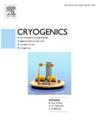Cryogenic cooling and fuel cell hybrid system for HTS maglev trains Employing liquid hydrogen
IF 2.1
3区 工程技术
Q3 PHYSICS, APPLIED
引用次数: 0
Abstract
High-Temperature Superconducting (HTS) maglev trains hold great promise for transforming transportation, achieving speeds beyond 1000 km/h with superior energy efficiency. However, maintaining the superconducting state requires cryogenic cooling, which presents challenges under constrained space, weight, and power conditions. To overcome these limitations, this study proposes a hybrid system combining a liquid hydrogen (LH2) thermal battery and a fuel cell. LH2, with its low boiling point and high latent heat, serves as an effective coolant for HTS magnets, while the evaporated hydrogen is utilized in a fuel cell to produce onboard power, enhancing the system’s overall efficiency. To validate the proposed concept, a thermal network model was developed incorporating sections for HTS magnets, an LH2 thermal battery, and a fuel cell. The HTS magnet section models the thermal resistance variation due to LH2 level reduction and considers heat influx from conduction, radiation, and AC losses. The LH2 thermal battery simulates hydrogen evaporation caused by heat transfer, with the vaporized hydrogen directed to the fuel cell for power generation. Simulations using MATLAB Simscape analyzed the dynamic thermal behavior of the system under operational scenarios. The study demonstrates the capability of the LH2 thermal battery to maintain thermal stability for HTS magnets while leveraging evaporated hydrogen for onboard power generation. This integrated approach offers a foundation for optimizing cryogenic cooling and energy management, providing key insights for the development of next-generation HTS maglev train systems.
液态氢磁悬浮列车低温冷却与燃料电池混合系统
高温超导(HTS)磁悬浮列车在改变交通运输方面有着巨大的希望,以优越的能源效率实现超过1000公里/小时的速度。然而,保持超导状态需要低温冷却,这在有限的空间、重量和功率条件下提出了挑战。为了克服这些限制,本研究提出了一种结合液氢(LH2)热电池和燃料电池的混合系统。LH2具有低沸点和高潜热的特点,可以作为高温超导磁体的有效冷却剂,而蒸发的氢可以在燃料电池中用于产生车载电力,从而提高系统的整体效率。为了验证所提出的概念,开发了一个热网络模型,包括高温超导磁体、LH2热电池和燃料电池的部分。高温超导磁体部分模拟了LH2水平降低导致的热阻变化,并考虑了传导、辐射和交流损失带来的热流入。LH2热电池模拟由传热引起的氢气蒸发,蒸发后的氢气直接进入燃料电池发电。利用MATLAB Simscape进行仿真,分析了系统在运行场景下的动态热行为。该研究证明了LH2热电池在利用蒸发氢用于机载发电的同时保持高温超导磁体热稳定性的能力。这种集成方法为优化低温冷却和能量管理提供了基础,为下一代高温超导磁悬浮列车系统的开发提供了关键见解。
本文章由计算机程序翻译,如有差异,请以英文原文为准。
求助全文
约1分钟内获得全文
求助全文
来源期刊

Cryogenics
物理-热力学
CiteScore
3.80
自引率
9.50%
发文量
0
审稿时长
2.1 months
期刊介绍:
Cryogenics is the world''s leading journal focusing on all aspects of cryoengineering and cryogenics. Papers published in Cryogenics cover a wide variety of subjects in low temperature engineering and research. Among the areas covered are:
- Applications of superconductivity: magnets, electronics, devices
- Superconductors and their properties
- Properties of materials: metals, alloys, composites, polymers, insulations
- New applications of cryogenic technology to processes, devices, machinery
- Refrigeration and liquefaction technology
- Thermodynamics
- Fluid properties and fluid mechanics
- Heat transfer
- Thermometry and measurement science
- Cryogenics in medicine
- Cryoelectronics
 求助内容:
求助内容: 应助结果提醒方式:
应助结果提醒方式:


